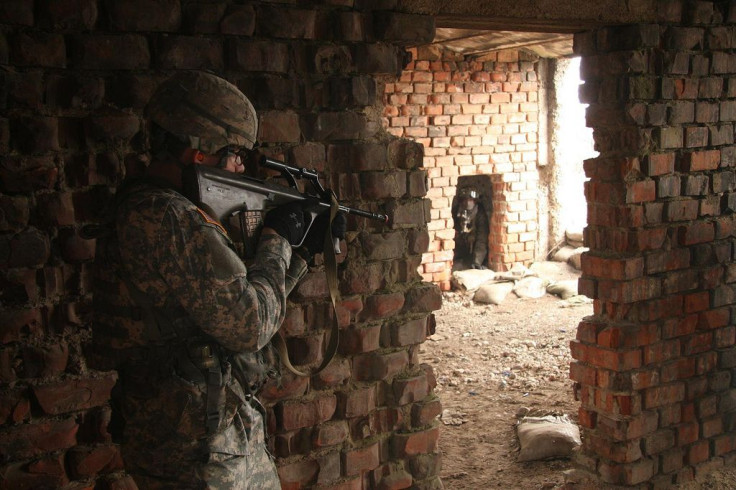Hormone Replacement Therapy For TBI: Former Sergeant Is Working Hard To Improve Soliders Access To Care

For those who have served in the military, you know that it's commonplace for active duty soliders to sustain a traumatic brain injury (TBI). And often times these injuries can cause long-term health problems that aren't exactly cost-effective. According to the Defense and Veterans Brain Injury Center, within the past 15 years, over 330,000 military personnel have been diagnosed with TBI. We may know a lot about TBI and how to treat it, but for many soliders coming home, this information isn't enough.
After experiencing this first hand, Sgt. 1st Class Andrew Marr is looking to change how we go about treating military members with TBI, Fox News reported. During his time as an U.S. Army Special Forces green beret explosive breacher, Marr received multiple TBIs in 2006, which ultimately cut his career short. Now, he has turned his attention to helping other soldiers looking to find (and fund) any necessary treatment.
According to Fox, Marr is working with Dr. Mark Gordon, an interventional endocrinologist and TBI treatment specialist at Millennium Health Centers in Los Angeles ; Gordon is who treated Marr's injuries. Together, the two have organized a campaign to try and raise funds for soldiers in need of natural hormone replacement therapy. In Marr’s own experience, he found that hormone therapy worked better than any other prescription medication.
“Head trauma often produces a disruption in your hormonal balance,” Marr told Fox. “If you can pinpoint which hormones are affected, and which are insufficient or deficient, you can address the problem.”
The Hormone Health Network says that when it comes to brain injuries, hormone therapy can be a way to improve the side effects associated with trauma. Since two important components of the endocrine system, the pituitary gland, and the hypothalamus are located in your head, subsequent brain injury can disturb the daily hormonal function of these glands. Sometimes, the results will show up almost immediately, but for others, it may take a few months or years to occur.
When any one of these glands is damaged, patients can start to experience a slew of health oroblems. For example, adrenal insufficiency could lead to fatigue, weight loss and low blood pressure, while diabetes insipidus could result in frequent urination or extreme thirst. What's more is hyponatremia, which knocks the body's levels of water and salt levels off balance, can cause frequent headaches, fatigue, vomiting, confusion, and convulsions.
A few treatments of hormone therapy is enough to correct these problems...in some people. Other, more severe TBI cases may require life-long therapy. Marr says that his goal is to try and find an inexpensive solution to this existing problem. After cost, Marr wants to make sure a solider's solution doesn't disrupt his or her life.
“It’s difficult for guys who have jobs to say, ‘Hey, I have to put my whole life on hold for this,’” Marr said. “We needed a way around that where we can effectively treat it and people don’t have to disrupt their lives to do it.”
Marr and Gordon have set their accesible program up through WarriorAngelsFoundation.com. With this site, soldiers and vets who have received TBIs while on the job can submit their medical history, along with proof of their service, in order to declare their eligibility. Once a solider is accepted, the foundation will request he or she gets blood work done, which will eventually be sent to Gordon and his colleagues in California.
After Gordon has received all the necessary information, he'll have a better idea of the type of hormone therapy that the patient will need. A consultation Skype session allows Gordon, or one of his trained physicians, to speak with the patient and detail the necessary steps of the treatment. Then, Gordon and his team will develop a natural, bioidentical, injectable hormone replacement therapy that will be sent directly to the soldier.
“It’s highly individualized; no two people are the same,” Marr said. “Whatever you’re found to be deficient or insufficient in, that’s what we’re going to replace.”
Once the patient starts the therapy, they will follow up via Skype every 30, 90, and 120 days to fill out assessments regarding their treatments.
To date, the Warrior Angels Foundation has received a $100,000 donation from the University Compounding Pharmacy of San Diego to cover the cost of the hormone treatments, but more donations will be required to stay afloat.
“We’re taking out the middleman of the waiting room and [Veteran’s Affairs (VA)] and reducing the costs of what the VA and government spends on TBI patients,” Marr said. He also told Fox that the therapy gets less expensive the longer the patient continues; fewer tests and treatments are required down the road.
Right now, 15 patients have enrolled in the program, and Gordon has trained 42 physicians to help. The program made its debut on Friday, Sept.11, to commemorate the soldiers lost to the war on terrorism.
Marr estimates that the hormone therapy will cost $5,000 per person. With 400 patients on their waiting list already, Marr is turning toward public donations to help raise the estimated $2 million necessary for his and Gordon's project to continue.
To contribute to the cause, you can click here, or spread the word on Facebook by liking their page.



























